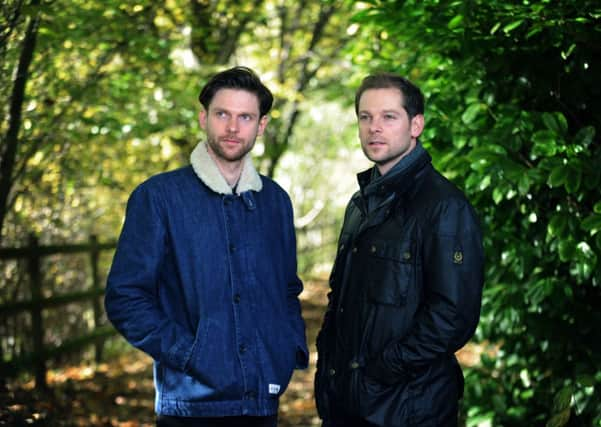How Alzheimer’s took my dad, by ex-Kaiser Chiefs drummer Nick Hodgson


IT began, as it so often does, with little things like confusing his knife and fork at dinner time.
But what Kenneth Hodgson’s family initially hoped was just forgetfulness soon developed into a devastating illness that left him unrecognisable from the brilliant businessman and entrepreneur they knew and loved.


Advertisement
Hide AdAdvertisement
Hide AdMr Hodgson – father of the Kaiser Chiefs’ former drummer Nick Hodgson – died two years ago of Alzheimer’s, at the age of just 60.
Now the musician and his brother Tim, a property investor, are sharing their family’s story to support the Yorkshire Post’s Christmas appeal in aid of the Alzheimer’s Society, the leading UK care and research charity for people with this disease.
There is growing public awareness about dementia thanks to the campaigning of high-profile people like Sir Terry Pratchett, who was diagnosed with a rare form of early-onset Alzheimer’s disease in 2007.
The author of the best-selling Discworld series is among those raising awareness about this dreadful disease, the symptoms of which include memory loss, confusion and problems with speech and understanding.
Advertisement
Hide AdAdvertisement
Hide AdIn Kenneth Hodgson’s case, though, the diagnosis didn’t come straight away.
“The early signs appear as little behavioural quirks that you try and convince yourself are due to the person having a bad day or stress from work,” Nick, 36, recalls.
“I remember thinking that elements of my dad’s behaviour were like Alzheimer’s but the prospect of the notion was so terrifying that I always tried to explain it in some other way.
“It starts with little things – there was a time when he and I put up a picture and he couldn’t tell if it was straight or not.
Advertisement
Hide AdAdvertisement
Hide Ad“He started getting confused over his knife and fork at dinner time – ‘the cutlery conundrum’, we called it. I remember him counting and re-counting some glasses at Christmas when he was preparing drinks for the family.
“I stood with him and helped him and pretended it was normal but there is a scary realisation in these early signs.”
Nick, who was away on tour with the Leeds-based Kaiser Chiefs a lot during this time, called home every day to anxiously hear the latest update.
“My dad’s condition was getting worse. My Mum would tell me the latest irregular patterns in his behaviour and my Dad would say he felt ‘champion’,” he says.
Advertisement
Hide AdAdvertisement
Hide Ad“I started to feel very nervous in my stomach all the time, I didn’t know what was going to happen next. I would hope that the next time I called home there wouldn’t be another update on Dad, that everything was fine.”
Because Kenneth was so young, nobody suspected it was Alzheimer’s and he was initially treated for stress and anxiety.
But after developing problems with his eyesight, he sought further advice from consultants, who investigated the possibility of a brain tumour before eventually diagnosing Alzheimer’s.
In the last year of his life, Kenneth’s health rapidly deteriorated and he began having epileptic fits brought on by the disease.
Advertisement
Hide AdAdvertisement
Hide Ad“It was clear they were having a devastating blow to his brain, as he would deteriorate after each seizure and lose some more of himself,” says 38 year-old Tim.
Nick adds: “Every time he had one he became more and more remote and incapable of doing things for himself.
“It got to a point where he couldn’t live at home and had to be cared for 24 hours a day.
“For the last week of his life my mum and my brother and I stayed with him, sleeping on the floor next to his bed in the nursing home.
Advertisement
Hide AdAdvertisement
Hide Ad“I would look at him and it was hard to believe what had happened. My dad, who I remembered being such a strong figure, a businessman, a funny guy, an inspiration was completely taken over by this terrible disease.
“He couldn’t eat or drink and he couldn’t acknowledge us.”
Kenneth was born in 1950 in North Shields, on Tyneside. Always a hard worker with a head for numbers, he was the first in his family to go to university and later qualified as a chartered accountant.
While working for West Riding Buses in Wakefield during the 1980s, he led a management buy-out of the company, which flourished under his ownership.
He sold it in the early 90s and founded Harrogate-based property investment firm Westcourt Group, which Tim now runs.
Advertisement
Hide AdAdvertisement
Hide AdEarlier this year, Tim paid tribute to his dad when a Grade II listed building in Park Row, Leeds, which Westcourt Group had refurbished, was renamed Kenneth Hodgson House in his honour.
“My father was a brilliant businessman and entrepreneur,” he says, proudly.
“He loved his work and strove all his life to succeed.
“Many times over the years people who worked with him and for him have told me of what a brilliant mind my dad had.
“I’d always spoken about business to my dad. For some years I lived in London working in the property market and most days I’d touch base with my dad on the phone talking about opportunities and deals.
Advertisement
Hide AdAdvertisement
Hide Ad“He loved to talk shop. When he was ill my father once said that he knew ‘his brain was dying’.
“I remember that clearly. Losing my mentor and friend was the hardest part.”
The family received valuable advice and support from the Alzheimer’s Society during their ordeal.
“Their website is very helpful, providing so much information in their factsheets about all aspects of the disease,” says Tim.
Advertisement
Hide AdAdvertisement
Hide Ad“My mother especially used to read the forum to learn about others’ experiences.
“She found the coping and caring course run by the Alzheimer’s Society really helpful and the best thing for her was being able to meet up with other carers.
“In fact, at the end of the course a few of them decided to meet up regularly for coffee and a chat.
“Even though my father has died my mother still meets up with the other carers regularly and support each other – because they have all been in the same situation.”
Advertisement
Hide AdAdvertisement
Hide AdAccording to the Alzheimer’s Society there are around 800,000 people with the disease in the UK, including more than 58,000 in Yorkshire, with numbers set to rise to more than a million by 2021.
Dementia costs the UK more than £23bn a year, according to the charity, with this figure set to rise to £27bn by 2018.
It’s a huge issue and last year David Cameron announced that funding for research into dementia was to be more than doubled to £66m by 2015, in a bid to make the UK a world leader in the field.
Alzheimer’s disease is the commonest cause of dementia, with damaged tissue building up in the brain to form deposits which cause the brain cells around them to die.
Advertisement
Hide AdAdvertisement
Hide AdDementia is also one of the main causes of disability later in life but the hope is that researchers will be able to find a way of slowing down its progress and, ultimately, a cure.
“It is a disease of the brain that destroys lives and takes away loved ones,” says Tim.
“Hundreds of thousands of husbands and wives and children find themselves becoming carers and the more people know about this disease, the more people know about what help is out there.”
Nick, who left the Kaiser Chiefs last December to work as a producer and songwriter, adds: “I think there’s a myth about Alzheimer’s disease. Some people think that it’s just memory loss but those who’ve been affected by it know that it is a devastating illness that effectively takes people away from themselves and their families.
“We want to raise awareness and money for research and support for carers, sufferers and their families.”